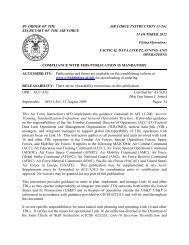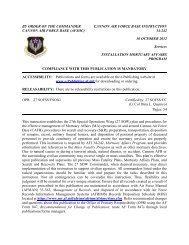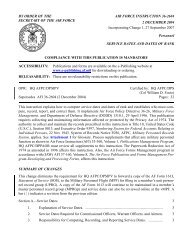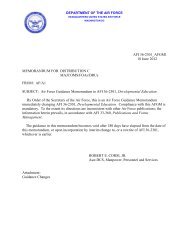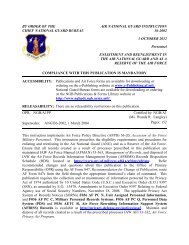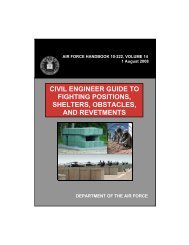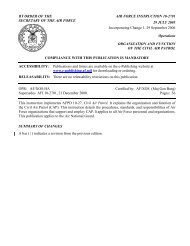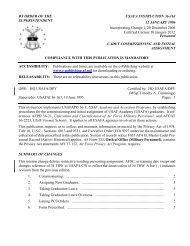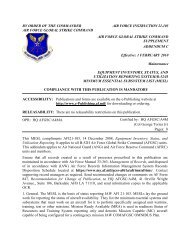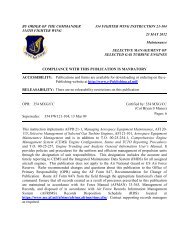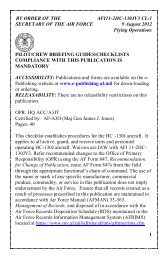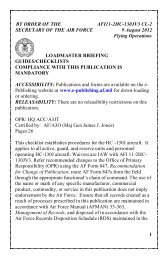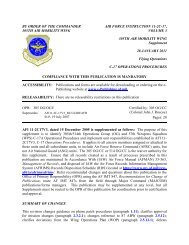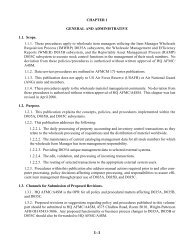MEMORANDUM FOR A1 - Air Force E-Publishing
MEMORANDUM FOR A1 - Air Force E-Publishing
MEMORANDUM FOR A1 - Air Force E-Publishing
Create successful ePaper yourself
Turn your PDF publications into a flip-book with our unique Google optimized e-Paper software.
AFI91-202 5 AUGUST 2011 87<br />
Chapter 10<br />
SPACE SAFETY<br />
10.1. Program Management. All units conducting space-related missions must have a<br />
comprehensive space safety program. Reference AFI 91-217, Space Safety and Mishap<br />
Prevention Program, for specific space safety program requirements. Reference AFMAN 91-<br />
222, Space Safety Investigation and Reports, for specific investigative reporting guidance.<br />
10.2. Program Overview. All DoD activities with the potential to inadvertently and/or<br />
adversely affect spacecraft or humans in space shall be conducted in a safe and reasonable<br />
manner that protects space systems, their mission effectiveness, and humans in space, consistent<br />
with national security requirements IAW DoDD 3100.10, Space Policy.<br />
10.3. Space Control Systems. Space Control Systems, which include systems such as the<br />
Space Surveillance Network, Command and Control Warning, and Offensive and Defensive<br />
Counter Space Systems, have unique missions that don’t directly support other space systems.<br />
All organizations that test or operate space control systems will have a space safety program.<br />
10.4. Design, Development, Integration and Testing. Space systems will be designed, tested<br />
and operated in such a manner to:<br />
10.4.1. In order to prevent design and operational problems, it is critical that space safety<br />
personnel (e.g. system safety managers) are included throughout all phases of a system’s<br />
lifetime.<br />
10.4.2. Local System Safety Managers must be included at all milestone decision points to<br />
effectively manage the risks in each program.<br />
10.5. Launch, Range and Reentry Safety. The launch safety program covers activities<br />
associated with the ground handling, launching and pre-orbital operations of space systems. It<br />
also includes activities connected with the deployment, operation, reentry and recovery (if<br />
required) of test vehicles or payloads that do not attain orbit (either planned or unplanned).<br />
NOTE: Weapon safety programs cover intercontinental ballistic missile test launches.<br />
10.6. Orbital Safety. The high cost of orbital assets, their unique operational design and the<br />
irrecoverable nature of orbital hardware makes mishap prevention a critical component of orbital<br />
systems, from the initial design phase through end-of-life activities. The orbital safety program<br />
covers all activities associated with the development, testing and operation of space vehicles in<br />
orbit or deep space, to include spacecraft design, orbital operations, reentry, recovery and<br />
disposal elements.<br />
10.7. Space Safety Council (SSC). The SSC will assist the AF/SE in fulfilling oversight<br />
responsibilities through effective governance and management. This council, chaired by HQ<br />
AFSC/SES, is composed of the MAJCOM/SEs or their representatives. Other military/civil<br />
space agencies are invited to participate in the cross-flow of information. The council will hold at<br />
least one annual meeting. The SSC shall:<br />
10.7.1. Recommend DoD/federal and commercial space safety policy, prepare and monitor<br />
DoD/federal and commercial space safety directives or instructions concerning safety issues.<br />
10.7.2. Promote space safety initiatives for both DoD/federal and commercial space flight.



